VMU’s Faculty of Economics and Management Eduniversal award
This year the fac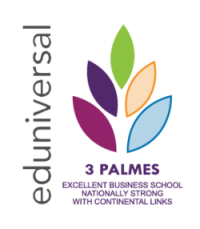 ulty of Economics and Management was evaluated as excellent business school by Eduniversal – international business ranking. FEM got 3 Palmes, which means that faculty is nationally strong and align with other 700 best business schools in the world.
ulty of Economics and Management was evaluated as excellent business school by Eduniversal – international business ranking. FEM got 3 Palmes, which means that faculty is nationally strong and align with other 700 best business schools in the world.
This year the award of ranking was in Perth (Australia), where VMU Faculty of Economics and Management was represented by Dean Rita Bendaravičiene.
The aim of Eduniversal business universities’ ranking is objectively compare various business and management schools around the world. The ranking helps for students and academic staff choose university for studies and work as well. There are 1000 business schools from 154 countries all over the world, which are evaluated by Eduniversal ranking.
International business competition
Peak Time 2017, the biggest international business competition for bachelor students in Eastern Europe, is happening again for the 18th time. Each year Peak Time attracts up to 2000 applicants from around 80 countries. These students compete in CESIM simulations and case studies and the most successful 20 teams and 20 individuals are selected for the 3 day finals in Riga, Latvia, where the best and most motivated in the world can network among themselves, see amazing guest lectures by respected speakers and compete in intense simulations and case studies based on real problems.
This year the Peak Time 2017 will take place from May 5 to May 7 in Stockholm School of Economics in Riga.
Registration deadline: December 20, 23:59.
Don’t miss your chance to shape the tomorrow of business!
Olivia Wells: VMU is Destined for Great Things
Seeking to increase student awareness and participation in political life, to nurture tolerance and human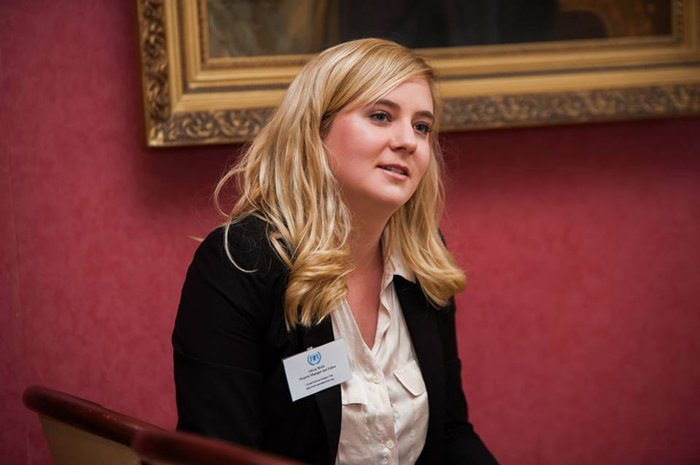 rights and to analyze global problems, the United Nations Student Club was founded several years ago at Vytautas Magnus University in Kaunas, Lithuania, eventually evolving into the Lithuanian United Nations Youth Association, LUNYA. This summer the association was recognized as an official member of the World Federation of United Nations Associations (WFUNA) and was invited to implement joint projects with Columbia University in New York, USA.
rights and to analyze global problems, the United Nations Student Club was founded several years ago at Vytautas Magnus University in Kaunas, Lithuania, eventually evolving into the Lithuanian United Nations Youth Association, LUNYA. This summer the association was recognized as an official member of the World Federation of United Nations Associations (WFUNA) and was invited to implement joint projects with Columbia University in New York, USA.
The head of LUNYA, Olivia Wells, is an American VMU student. She shared some of her impressions about the studies in Lithuania and Europe and discussed the youth association’s projects.
Why did you choose to study at VMU?
Majoring in Classics at University of Southern California brought me to Athens, Greece, where I spent a year studying abroad. I fell in love with Greece and Europe in general and decided that I wanted to continue my studies in Europe. While in Greece, I had made the decision to change my focus to international relations and human rights and felt that I would get more out of studying in Europe than in America. Additionally, even with scholarships, studying in the U.S. is ridiculously expensive and was becoming more and more difficult for me to afford. I also thought it would be unique to study international relations in a part of the world that I knew very little about – we don’t learn much about Eastern Europe in the U.S. (except as a monolithic bloc with historical ties to Russia).
What do you think about the quality of studies at VMU, the community etc.?
VMU really surprised me. Coming from a big school like University of Southern California, it’s nice to be in a smaller environment where students can develop meaningful relationships with teachers and the administration. Any place where you live or study is what you make of it. So, if you are an active student, VMU is a great school because the professors and administration are more than willing to work with you to help your projects come to life. There are a handful of really great professors that are already teaching there. My program at the Faculty of Political Sciences and Diplomacy is very new and it still has some kinks to work out. But the administration is very open to working with the students to find out what those kinks are and search for solutions.
Additionally, as Kaunas becomes more and more international, the opportunity to host international events with other universities and students from all over the world increases. Though they both still have some growing pains to go through, I think the city and the university are potentially destined for great things.
How did you decide to found the Lithuanian United Nations Youth Association (LUNYA)? Is this your project?
Actually, LUNYA evolved out of the United Nations Students Club (UNSC), which was an organization that I became involved with shortly after its founding. When I joined the club, there were a lot of internal problems and disagreements among its members, which meant it was not functioning properly. When I was voted in as the new president a few months later, we revamped the club and began actively pursuing new members and new projects, establishing ourselves as a successful student organization (and one of the most active on campus). VMU took notice of our enthusiasm and outreach and decided to work with us to take the club one step further – thus began our cooperation with the United Nations and our transformation into the association we are today.
Why do you think this organization in VMU is so important for Lithuania? And why is LUNYA important in Europe?
Through LUNYA we hope to put Lithuania on the map of youth organized EU-wide events. There are not many youth organizations in Lithuania hosting or attending large-scale EU events. There are also not many large-scale youth organized events taking place in Lithuania. We hope to fill this gap by developing and promoting EU-wide events (such as transnational Model UNs, Youth Forums, and various other symposiums) that would be hosted here and sending students from Lithuania (international and Lithuanian) to represent this country in events throughout Europe.
Is LUNYA an official member of the World Federation of United Nations Associations (WFUNA)?
Yes. As of July 2016, LUNYA is an official member of the WFUNA – representing the youth wing of the United Nations Lithuanian Association. I had a meeting at the United Nations with the youth program officer of WFUNA to finalize the agreement and talk about future projects. On our page on WFUNA’s website, you can read about our current projects, our strengths as an organization, and our potential future projects – one of which is organizing an annual Baltic Model UN, which we are hoping to implement in spring 2017.
When you were in Lithuania and participated in various debates and conferences, in your opinion, what problems are important to Lithuanian youth?
Lithuanian youth tend to be most concerned with political issues having to do with Russia, Eastern Europe, regional security, etc. Given Lithuania’s geopolitical history, these concerns make sense. And while LUNYA has hosted several events focused on these topics (and will continue doing so), we also believe it’s important to talk about other pressing issues occurring in Europe and around the world – in an effort to promote understanding and tolerance.
One thing we have noticed is that the majority of students that attend our events are international students. Lithuanian students seem more reluctant to spend time attending extracurricular events, unless they are receiving class credit for their participation. We are currently brainstorming how to get more Lithuanian students involved in our projects.
Can you tell us more about future joint activities between LUNYA and Columbia University in New York? How can VMU professors and students participate in this project?
The Editor and Programs Director at the Council for European Studies (CES), Katrine Øgaard Jensen, reached out to me recently to discuss collaboration with LUNYA. CES is the leading international organization for the study of Europe and works in conjunction with Columbia University. Katrine was familiar with our work and asked if we would be interested in collaborating with CES on a new project. CES is planning on publishing a blog and they want LUNYA and VMU to be the primary contributors to it. It’s a great way for students and professors at VMU to have their work published by a well-known and highly regarded. We have not finalized the collaboration yet, but are very excited about the future prospects.
In your opinion, how can VMU contribute to global education and sustainable development?
VMU can contribute by continuing to work with student organizations to host events that raise awareness of these issues. I think these events are the key to engendering a culture of tolerance and understanding among Lithuanian youth. One thing I would like to see is sending students to more international events that have to do with global education, sustainable development, and human rights. The benefit of VMU students attending these events is two-fold: the students would gain indispensable knowledge that they could then impart on their fellow students upon their return and the students can act as ambassadors to promote Lithuania and VMU abroad.
What about your future plans, will you return to Lithuania? Will you continue LUNYA projects and activities?
I will continue working on LUNYA projects until the end of this academic year when I graduate in the spring, at which point I imagine I will still be involved with the organization remotely. I am working closely with Lithuanian correspondents at the UN to continue expanding and building on LUNYA’s past work, and I hope by the time I leave the organization we will be established well enough for the next president to take over easily.
As for my future plans – I will be working with the U.S. Embassy in Athens, Greece this spring and the refugee/immigrant NGO, Praksis, while writing my bachelor’s thesis. I hope to then work as a Fulbright scholar for the 2017/2018 academic year, after which I will pursue my master’s degree in Europe. Even though I will most likely not pursue a master’s degree in Lithuania, I plan on retaining my ties to the country for many years to come.
Apply Now: Erasmus+ Traineeship Competition
The first competition is open for Erasmus+ student or recent graduate traineeship grants. Application deadline is 31st of January, 2017.
The placement period is 2–4 months. Traineeship must end before 29-09-2017 (for recent graduates – a year after graduation).
Selection
All VMU fulltime degree students who have not used more than 10 months of their Erasmus mobility (study / traineeship) period are eligible for the Erasmus grant.
Selection documents
For student traineeship (traineeship during student’s year of studies)
- Filled-in selection form
- Confirmation by the company or organization (attached to the selection form as a .pdf document) – obligatory
Documents to be submitted online
For recent graduate traineeship (application must be submitted during the last year of studies)
- Application form
- Confirmation by the company or organization
- Recommendation by a faculty member (obligatory)
The priority in the selection is given to
- students whose placement is an obligatory part of their study programme;
- students who have never been Erasmus traineeship students before.
Selection criteria
- student’s motivation
- good knowledge of the language which will be used during the traineeship
- student’s work, study, traineeship, participation in the international / academic projects, social activities experience in Lithuania and abroad
- conformability between the chosen traineeship and student’s study programme
- study results (first year MA students should attach transcript of records of their BA/MA degree to the application form).
The competition results will be sent to every participant via e-mail as well as published on VMU website and information boards on 13th February, 2017.
Vytautas Magnus University International Office
Mr Konstantinas Kurževas
Address: S. Daukanto g. 27, 308
E-mail: konstantinas.kurzevas@vdu.lt
Phone:
+370-37-327987
Apply Now: Bilateral Exchange Abroad
VMU International Office has announced competition for bilateral exchange studies or internship abroad in spring semester 2016/2017. Application deadline 30 September.
Participant Requirements
The participants eligible for the competition are students who:
- are Bachelor or Master students;
- have academic average higher than 8;
- are strongly motivated and have clear goals.
Students are requested to choose the accepting foreign university from the list of institutions that have signed bilateral agreements with VMU.
Application Documents
The following documents should be attached to the filled-in application:
- Curriculum Vitae (CV);
- your digital photo;
- confirmation from programme coordinator approving compatibility of the programmes.
Before choosing a foreign university, participants are requested to check if that university’s suggested courses match their study programme at VMU. Students are also welcome to consult with international relations coordinator in their faculties.
Selected students will be awarded the entire or partial VMU Bilateral Exchange Scholarship. Students who have not been awarded mobility grants but meet the criteria will have an opportunity to go to VMU Bilateral Exchange using their personal funds.
The size of the scholarship depends on the chosen length and country of the exchange.
| Country groups | I | II | III | IV |
| Countries | Australia, Argentina*, Ecuador, USA*, Canada*, Japan, Israel*, New Zealand, South Korea*, Venezuela, Singapore, Brazil*, Mexico, Indonesia, Malaysia*, India*, Taiwan* |
Ireland, Azerbaijan*, Denmark, Island, Lichtenstein, China*, France, Germany, Belgium, Finland, Sweden, Norway, Switzerland, Luxemburg, United Kingdom, Thailand* |
Austria, Greece, Spain, Italy, Netherlands, Kazakhstan*, Cyprus*, Malta, Portugal, Russia*, Pakistan* |
Armenia, Belorussia, Bulgaria, Georgia*, Czech Republic, Estonia*, Latvia*, Poland, Romania, Slovakia, Slovenia, Turkey, Hungary, Ukraine |
| Traineeship Scholarship | 600 EUR/month | 500 EUR/month | 450 EUR/month | 350 EUR/month |
| Study Scholarship | 500 EUR/month | 400 EUR/month | 350 EUR/month | 250 EUR/month |
* – asterisk marks the countries which you may choose for VMU Bilateral Study Exchange.
More information is available at the faculties and the International Office.
List of universities
More information
Competition for Erasmus+ Studies Abroad
If you want to gain even more international study experience, improve your foreign language skills, become a VMU Ambassador and a part of even bigger international community, participate in the competition and fill in the online application form until September 25, 2016.
Eligible applicants are full time and part time students, except 1st year bachelor degree student. Students with disabilities or special needs have an opportunity to receive additional funding.
The results of competition will be announced on September 30, 2016 on VMU website, VMU International Office announcement board. Each selected student will also be informed personally by e-mail.
Selection Criteria
- conformability between the plan for studies or research at the higher education institution abroad and the study programme at VMU;
- study results of the last semester;
- good knowledge of the language which will be used during the studies;
- the student’s motivation;
- student’s experience in work, studies, placement, international or academic projects and social activities in Lithuania and abroad;
- student’s ability to independently solve the arising problems.
Additional information about Erasmus+ studies, partnerships with Higher education institutions in foreign countries, criteria of the selection, scholarships and on individual consultations with International Programme’s Coordinators in faculty (Greta Brazaityte, 313 room).
Erasmus Coordinator:
International Scientific Conference
International Scientific Conference:
Economy without borders: Integration, Innovation, Cross-border cooperation
Black Sea Research Institute of Economy and Innovation (Odessa, Ukraine) and Vytautas Magnus university Faculty of Economics and Management (Kaunas, Lithuania) will organize international conference “Economy without borders: Integration, Innovation, Cross-border cooperation”.
Date: August 26th, 2016
For conference participation, It is necessary to send before August 24, 2016 to the organizing committee e-mail shumilova@iei.od.ua the abstracts of reporting and application form about conference participation (application form is you can find here).
Contact persons in Lithuania:
Rita Bendravičienė, Dr. of Management and Administration, Associate Professor,
Dean of Faculty of Economics and Management, Vytautas Magnus University
Lina Pilelienė, Dr. of Management and Administration, Associate Professor of Marketing,
Department of Marketing, Vytautas Magnus University lina.pileliene@vdu.lt
Contact persons in Ukraine:
Shumilova Tatyana, Junior Researcher
Black Sea Research Institute of Economy and Innovation
Теl. +38 (048) 709-38-69; Тel.mob. +38 (093) 253-57-15; E-mail: shumilova@iei.od.ua
More information here.
Professor Luigi Mittone visit in VMU
Prof. Luigi Mittone visited Vytautas Magnus University Faculty of Economics and management on January.
He had lectures with such topics as: Behavioral economics, expected utility theory, deviations from standard behavior in financial terms.
Professor was impressed about VMU FEM students: „I’m glad that the students are active. They have a great insights and questions. During the lecture, dialog becomes a great way to speak about economics. It helps remember information better“.
The Master of International economics double diploma lets study one year in Trento University. After studies, students get two independent diplomas: Vytautas Magnus University’s and University of Trento.
Prof. Pierre Semal visit in VMU FEM
Pierre Semal is professor in Université catholique de Louvain (Belgium) who visits Vytautas Magnus university Faculty of economics management each year.
Faculty has double degree program with Université catholique de Louvain and professor P. Semal each spring has Supply Chain Management course for Master students.
The course has a high level of interest from students, because of different type of lectures and visits to companies, when students have an opportunity to see logistics process and management.
Prof. P. Semal was awarded VMU honorary doctoral regalia in 2013. He contributed to the development, establishment of the Baltic Management Institute (BMI) and strengthened relations with Vytautas Magnus University.
Double diploma studies – amazing opportunity
Vytautas Magnus university Faculty of Economics and management gives an opportunity for master students to get two independent diplomas in study program Marketing and International Commercial. Džiugas Petruškevičius – student of FEM shares his opinion about such studies.
Džiugas Petruškevičius spent half-year in South Korea with Erasmus+ program during hisbachelor studies. During that time he found a need to know more about Europe. “My decision was promoted by former Faculty of Economic and management dean prof. Pranas Žukauskas, who suggested to think about ability to study in the master’s double diploma program. So ultimately I decided that European Union capital Belgium – the best choice for my training”, – told Džiugas Petruškevičius.
Study exclusivity
Famous leaders from business companies come for teaching students in Catholic university of Leuven. For example, once lecture was read by Belgium minister of foreign affairs Diddy Reynders and former stock exchange president (CEO) Bruno Colmant.
Study benefit
Double diploma studies allow to get better perception about other countries’ problems. It becomes a great opportunity to see team work between different country students. After master’s double degree studies, students are able to adapt knowledge much easier to the constantly changing environmental, work between multinational companies and see how cultural differences might affect organization’s atmosphere.




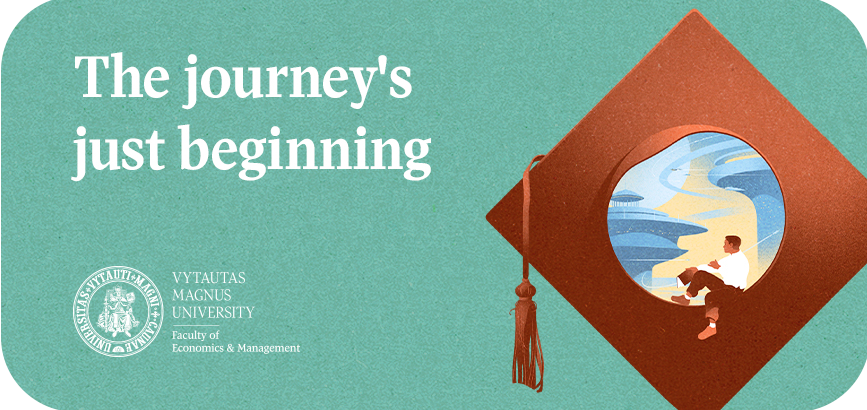
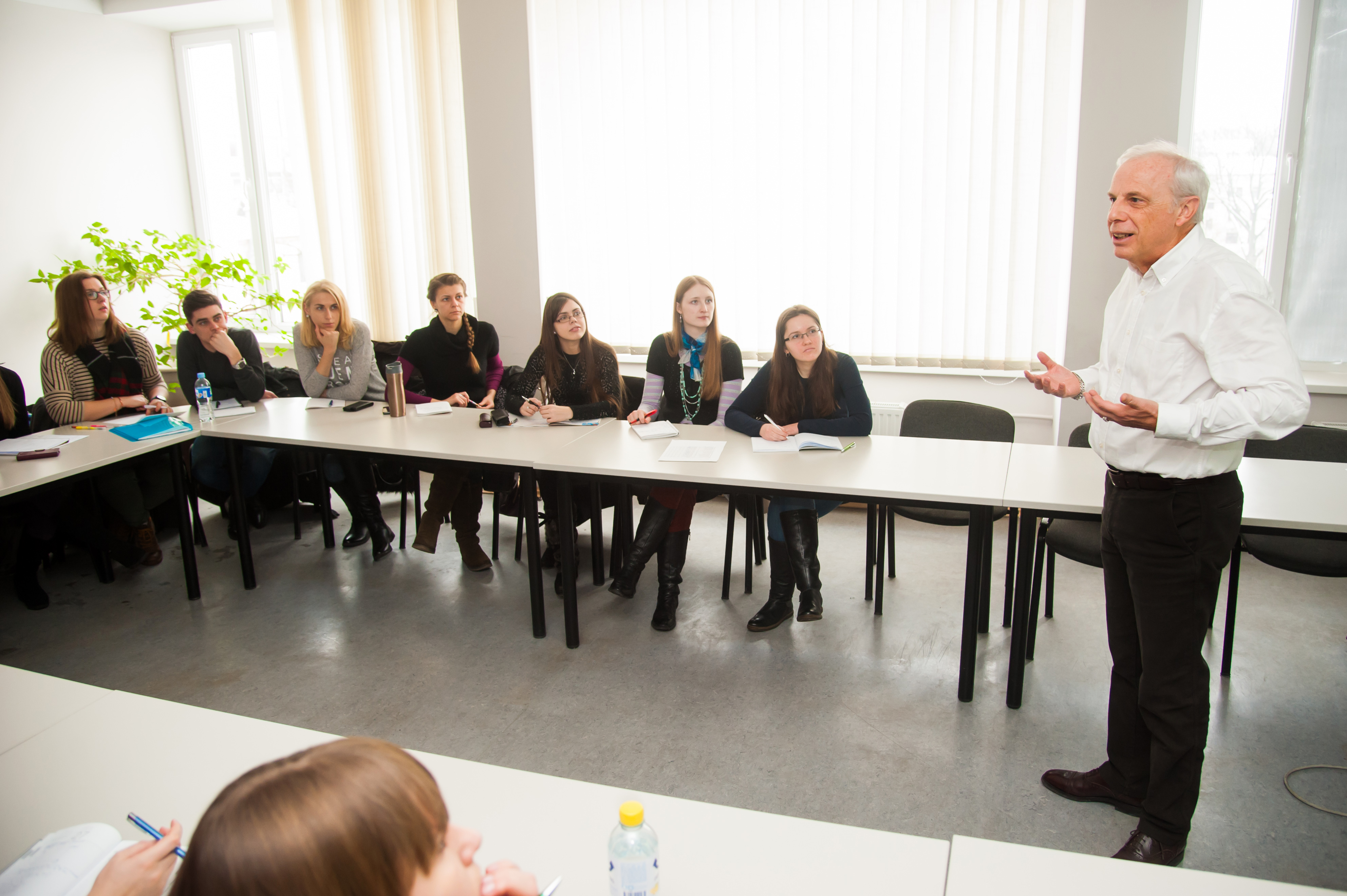
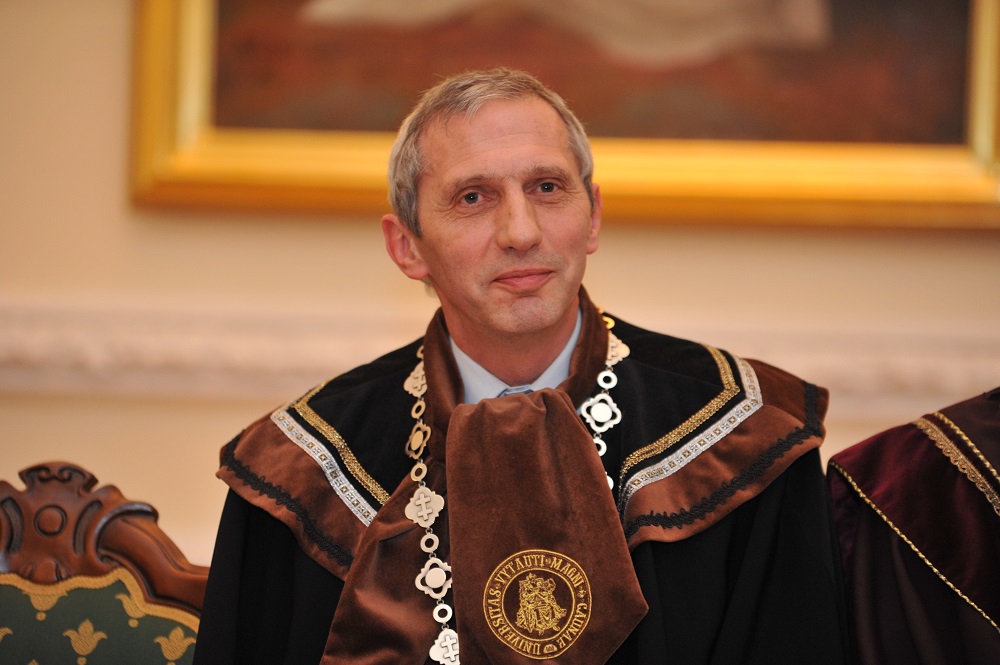
![20150926_131515(0)[1]](https://evf.vdu.lt/wp-content/uploads/2016/01/20150926_13151501.jpg)







